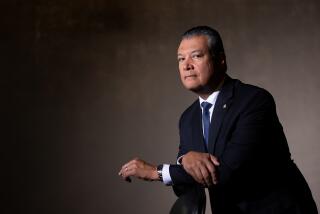Padilla to Urge Open Internet Access in L.A. Cable Contracts
- Share via
Los Angeles City Councilman Alex Padilla, whose recommendations on the hotly contested issue of high-speed Internet access on city-franchised cable lines have been awaited for months, said Monday that he will ask his colleagues to join him in demanding that cable companies provide open access as a condition of their agreements with the city.
If accepted by the council, Padilla’s proposal would represent a major shift in the way Los Angeles regulates cable companies. It also would insert the city into one of the most economically and politically volatile issues in the relationship between local governments and the companies that offer Internet access.
Proponents say open access is needed to prevent cable companies from throttling competition on their high-speed service--many times faster than conventional phone connections. Only if cable companies are required to provide access to other providers will consumers have real choices about how they use the Internet, advocates say.
Critics of open access complain that what they call “forced access” is an unfair infringement on the cable companies’ business and will discourage cable firms from rolling out the service. They also argue that a single, national policy on cable access would be preferable to a patchwork of policies enacted by cities across the country.
On Monday, Padilla acknowledged that his course will rile some leaders in the cable industry. Still, the councilman said he was confident of his position, which he said would withstand a legal challenge and, in his view, would be in the best interests of Los Angeles’ residents.
“We’re certainly pushing the envelope here,” Padilla said in a meeting with Times editors and reporters. “There’s no question about that.”
Padilla’s view is expected to carry significant weight with his colleagues for several reasons: He chairs a key council committee examining the question. He has studied the issue for months, and he is considered one of the council’s most technologically proficient members.
Padilla’s position was bolstered Monday by the release of an analysis prepared by the office of Chief Legislative Analyst Ron Deaton. In that report, Deaton and his staff concluded that the councilman’s approach was technically feasible and consistent with other precedents, including the Federal Communications Commission’s requirement of open access on high-speed Internet services provided by local phone companies.
The report also concludes that Los Angeles is on sound legal footing despite conflicting court rulings in the area.
With billions of dollars at stake, the issue has become one of the most bitterly debated at City Hall. Lobbyists for both sides have aggressively worked the issue, topping all other special interests last year in terms of their expenditures.
Under Padilla’s proposal, any cable company seeking renewal of its franchise agreement when it comes up in 2002 would be required to provide nondiscriminatory access to all Internet service providers on its system.
The cable companies also would be forced to deploy their services to every part of their franchise areas--a move intended to ensure that poor communities are not cut out--and would have to wire schools, libraries and public hospitals.
Those proposals come at a time of considerable uncertainty and turmoil, both politically and in the affected industries.
The FCC has urged cities to refrain from legislating in the area, but some have plunged ahead anyway. America Online and its allies have led the charge for open access, and have faced off against a coalition led by AT&T;, a major owner of local cable companies, including MediaOne in Los Angeles.
Locally, Mayor Richard Riordan for a time argued against open access, saying he did not believe the city should involve itself in what he saw as a national telecommunications debate.
But after being widely criticized--and having three of his five Information Technology Commission members quit--Riordan abruptly withdrew from the debate because, he said, his wife owns stock in America Online.
A spokesman for the mayor said Riordan and his staff would have no comment on the proposal by Padilla.
The councilman’s motion will be introduced Wednesday at a meeting of the Information Technology and General Services Committee. One of the committee’s other members, Councilman Rudy Svorinich, is thought to oppose the open access rules. Councilwoman Laura Chick, the third member, has not clearly indicated which way she’s likely to vote.
With so many of the nation’s biggest and most closely watched companies contesting the open access issue, a number of council members are likely to be forced to sit out the debate because of conflict of interest rules. That complicates any predictions about how it might turn out.
Meanwhile, the two sides in the debate show no signs of backing off.
“Our basic position is that we don’t support government-mandated access,” said Perry Parks, MediaOne’s vice president for public and governmental affairs. “Why come up with a mandated policy to fix a problem that hasn’t manifested yet?”
More to Read
Sign up for Essential California
The most important California stories and recommendations in your inbox every morning.
You may occasionally receive promotional content from the Los Angeles Times.











